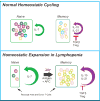T cell immune reconstitution following lymphodepletion
- PMID: 18023361
- PMCID: PMC2180244
- DOI: 10.1016/j.smim.2007.10.004
T cell immune reconstitution following lymphodepletion
Abstract
T cell reconstitution following lymphopenia from chemotherapy or stem cell transplant is often slow and incompetent, contributing to the development of infectious diseases, relapse, and graft-versus-host disease. This is due to the fact that de novo T cell production is impaired following cytoreductive regimens. T cells can be generated from two pathways: (1) thymus derived through active thymopoiesis and (2) peripherally expanded clones through homeostatic proliferation. During recovery from lymphopenia, the thymic pathway is commonly compromised in adults and T cells rely upon peripheral expansion to restore T cell numbers. This homeostatic proliferation exploits the high cytokine levels following lymphopenia to rapidly generate T cells in the periphery. Moreover, this early peripheral expansion of T cells can also be driven by exogenous antigen. This results in loss of T cell repertoire diversity and may predispose to auto- or allo-immunity. Alternatively, the high homeostatic proliferation following lymphopenia may facilitate expansion of anti-tumor immunity. Murine and human studies have provided insight into the cytokine and cellular regulators of these two pathways of T cell generation and the disparate portraits of T cell immunity created through robust thymopoiesis or peripheral expansion following lymphopenia. This insight has permitted the manipulation of the immune system to maximize anti-tumor immunity through lymphopenia and led to an appreciation of mechanisms that underlie graft versus host disease.
Figures



References
-
- Hakim FT, et al. Constraints on CD4 recovery postchemotherapy in adults: thymic insufficiency and apoptotic decline of expanded peripheral CD4 cells. Blood. 1997;90:3789–98. - PubMed
-
- Mackall CL, et al. Prolonged CD4 depletion after sequential autologous peripheral blood progenitor cell infusions in children and young adults. Blood. 2000;96:754–62. - PubMed
-
- Nordoy T, et al. Humoral immunity to viral and bacterial antigens in lymphoma patients 4-10 years after high-dose therapy with ABMT. Serological responses to revaccinations according to EBMT guidelines. Bone Marrow Transplant. 2001;28:681–7. - PubMed
-
- Small TN, et al. Comparison of immune reconstitution after unrelated and related T-cell-depleted bone marrow transplantation: effect of patient age and donor leukocyte infusions. Blood. 1999;93:467–80. - PubMed
-
- King C, et al. Homeostatic expansion of T cells during immune insufficiency generates autoimmunity. Cell. 2004;117:265–77. - PubMed
Publication types
MeSH terms
Substances
Grants and funding
LinkOut - more resources
Full Text Sources
Other Literature Sources
Medical

